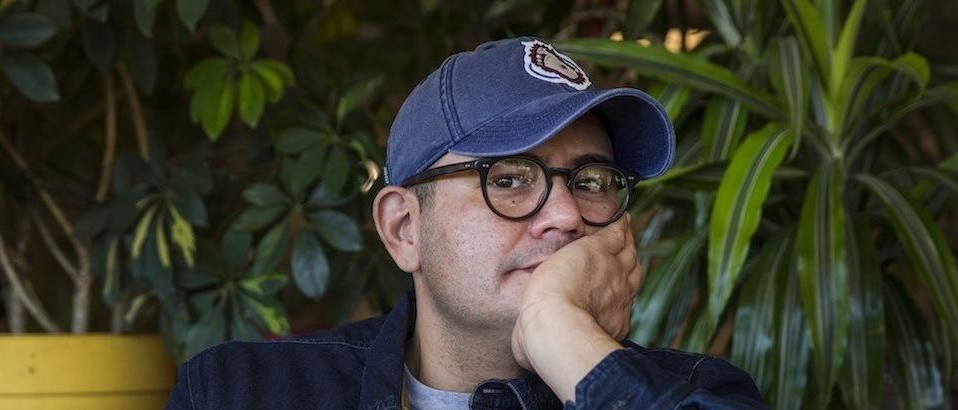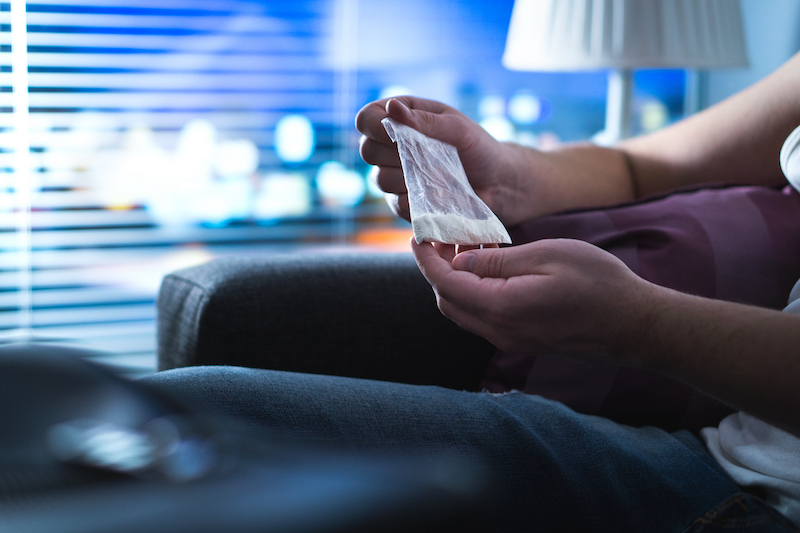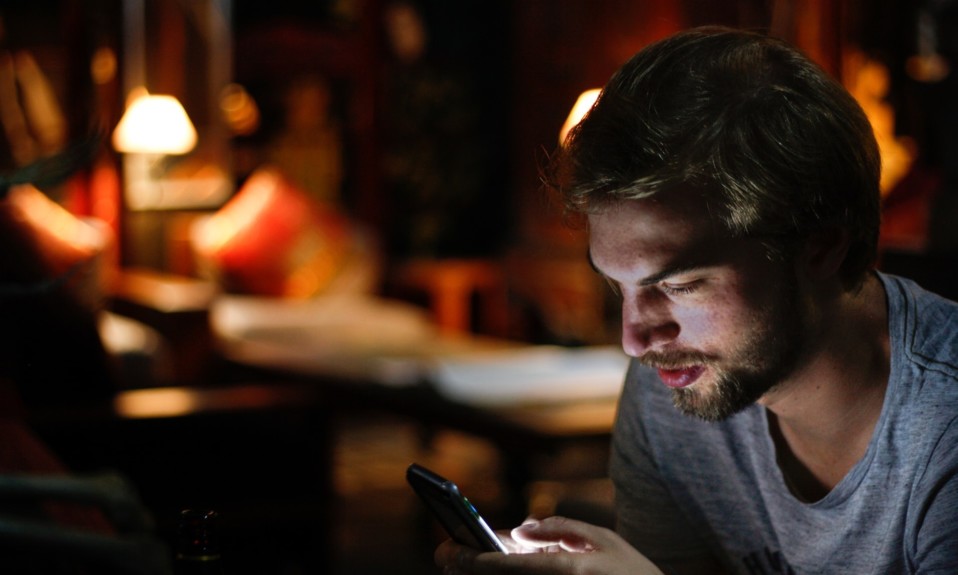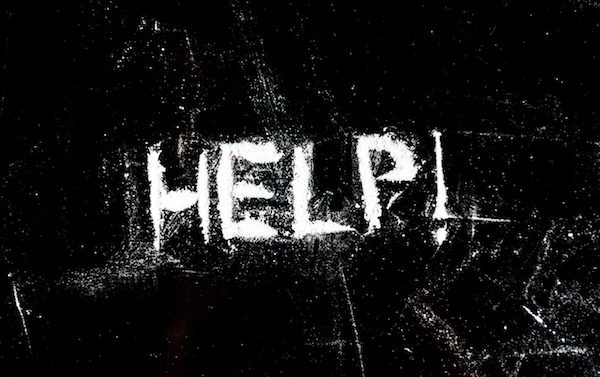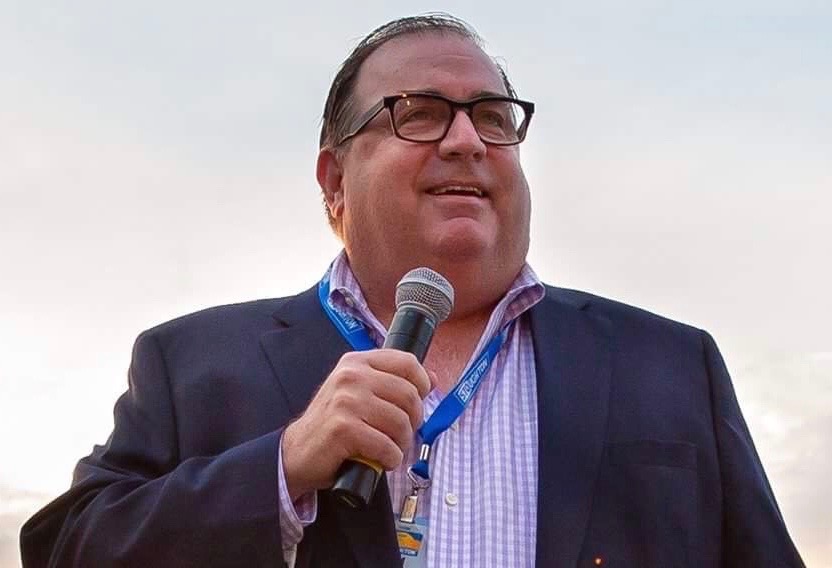The podcast Back from Broken has been good medicine for its listeners and guests—and for its host, Vic Vela, who is in recovery from cocaine addiction
By William Wagner
Vic Vela holds nothing back when recounting his zigzags through the maze of addiction. He’s so honest, in fact, you find yourself wincing at some of the gory details. And maybe that’s why his Colorado Public Radio (CPR) podcast Back from Broken, focused on addiction, mental health and physical issues, is a critical and commercial success. Honesty begets honesty. In other words, Vela’s guests trust him enough to open up about their own travails.
Guests ranging from chef and TV personality Andrew Zimmern and the rock band The Lumineers to onetime hotel executive Paul Scudo and former WNBA basketball player Chamique Holdsclaw have sat down at the Back from Broken mic since the podcast began airing in early 2020. And one by one, they’ve bared their souls.
“The secret [to the podcast] is just the format, which is they’re talking to someone who knows exactly what they’ve gone through,” says Vela, 44, who works on the CPR news beat when he’s not hosting Back from Broken. “When you empathize with someone and say, ‘I know exactly what you mean,’ there’s magic in that. You open up to people who get it. We’ve gone through the same hell.”
Vela’s Descent into Cocaine Addiction
And what exactly was Vela’s personal hell? It was difficult to see from afar. To the casual onlooker, he was a go-getter—the arrow was pointing up in his life. Vela built a career as a decorated journalist, working as an investigative crime reporter for the Albuquerque Journal and covering government and politics as a member of the Colorado Capitol Press Corps.
The lie I would tell my parents would be a slightly different version of what I would tell my partner. That would be a slightly different lie than what I would tell my editor. You don’t even know what the damn truth is anymore.”—Vic Vela, host of the podcast “Back from Broken”
Behind the scenes, however, something else was going on. Something dark. Something insidious. Beginning after he graduated from Metropolitan State University of Denver, cocaine steadily took control of his life.
“It started off where I would find the drug at bars on a Saturday night and say, ‘Why not? Let’s do it,’” Vela recalls. “And then it became Saturday and Sunday. And then it became Friday, Saturday and Sunday, and then Thursday, Friday, Saturday and Sunday. It got to the point where I was using cocaine every day. When your body becomes used to that foreign invader coming in and making you feel good every day, it’s hard to stop feeding the beast.”
And feed it he did. Over the next 15 years, Vela fed the beast his whole self.
His relationships were fraying, yet he couldn’t stop.
“I became difficult to be around because my moods became unpredictable,” Vela says. “And I wasn’t sleeping, so that made things worse. You combine cocaine with no sleep, and you have some real vivid hallucinations going on.”
Creditors came calling, yet he couldn’t stop.
“I made sure I had enough [money] to support my habit before I paid any bills,” Vela says. “You lie to yourself: ‘I don’t have a problem—I just interviewed the governor. I can call a U.S. senator right now.’ Yeah, you interviewed the senator today, but you also have creditors calling you.”
He became hopelessly entangled in all the lies he’d been telling, yet he couldn’t stop.
“You’re telling different lies to different people,” he says. “It’s an exhausting way to live. The lie I would tell my parents would be a slightly different version of what I would tell my partner. That would be a slightly different lie than what I would tell my editor. You don’t even know what the damn truth is anymore.”
He was diagnosed with HIV in 2006, yet he couldn’t stop.
“Being gay [like Vela is], there’s that underbelly of living a party-hearty lifestyle in the gay world,” he says. “The party-and-play element, so to speak, where you would have dangerous encounters with guys whose names you didn’t know, and you didn’t even ask their names. And sharing needles and things like that.”
His nose became torched from all the coke he had snorted, yet he couldn’t stop.
“I did a lot of damage to my nose,” he says. “So I stopped snorting cocaine and was just smoking and injecting it.”
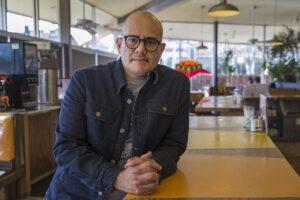
He was risking what little he had left every single day, yet he couldn’t stop.
“I was a good reporter, but carrying the load of daily drug use is really hard when you’re covering a legislative session,” says Vela. “Wearing a suit and tie, I’d walk outside the state capitol, duck behind a dumpster or in an alley across the street, and smoke crack and hide the pipe and hide the smell. Then I’d go back in the capitol and get back to work. Doing that every hour is a lot of work.”
And then in the wee hours one night in January 2015, he stopped. Out of the blue. No one was more surprised than Vela himself when it happened.
“I’m sitting there on my floor,” he recalls. “It’s 3 a.m.—again. I’m wide awake—again. I’m out of money—again. I’ve just run out of drugs—again. I was like, Am I really going to have this day again tomorrow? Am I really going to do this again? I just cried. And when I cried, it was like this weight was lifted. I didn’t know where it was going to go. I didn’t know if I’d be sober for one day or one week, but I had to fucking try. And thank God. I went to a meeting the very next day, and I’ve been sober ever since. It’s not easy. Recovery’s hard, but the way I lived was a lot harder.”
Rebirth with Back from Broken
With his newfound lucidity and inner peace, Vela got to thinking. By the late 2010s, he was a news host at CPR, an NPR affiliate that gave him a powerful platform.
“I’m a journalist, and I’m also a recovering drug addict,” he says. “How could I use my skill set, along with my expertise as someone who’s gone through recovery, to inform and help others? It came to my mind: How about a podcast where I talk to other people about their own recovery, and it’s just a show about one guy who’s gone through recovery talking to someone else about their recovery? It’s a real simple formula.”
When you empathize with someone and say, ‘I know exactly what you mean,’ there’s magic in that. You open up to people who get it. We’ve gone through the same hell.”—Vic Vela
The simplicity—the down-to-the-studs format—is what gives the podcast its resonance. Vela’s guests respond to the lack of ornamentation in a very real way. Case in point: Zimmern, the guest on season two’s first episode, which dropped on Feb. 26. Zimmern, a recovering alcoholic, probed a period of his life you’d have difficulty imagining when watching his colorful culinary adventures on TV:
“I was sleeping in an abandoned building with a bottle gang down on Sullivan Street, an ugly, wind-blown, abandoned part of the city. I lived there somewhere around 10, 11 months. My needs weren’t great. I needed what limited food I could muster, whatever limited monies I needed for alcohol. And I didn’t shower. I would steal bottles of Comet cleanser to sprinkle it around the dirty pile of clothes that I slept on every night. So the rats and roaches wouldn’t cross over me when I passed out. It was bad. …I was essentially off on my own at that point with no relationships.”
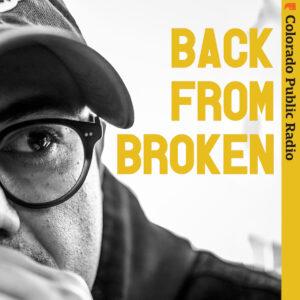
Back from Broken has stirred similar emotions in its listeners. In his 20-odd years as a journalist, Vela has never experienced anything quite like what his podcast has delivered.
“I’ve written investigative stories, I’ve uncovered corruption in police departments, I’ve written about politicians and governments and things that affect your lives,” Vela says. “But this is easily the most raw, emotionally positive response I’ve ever had. The podcast has directly touched people’s lives in a way that’s tremendous. People tell me every day—and this is not hyperbole—what the podcast means to them.”
And, of course, Back from Broken has helped Vela himself continue to heal. It keeps him accountable, gives him strength to forge ahead with his recovery. And the kicker? When he shows up to work, he’s no longer lugging baggage. “Colorado Public Radio is the only sober job I’ve ever held,” he says, “and it’s wonderful.”


